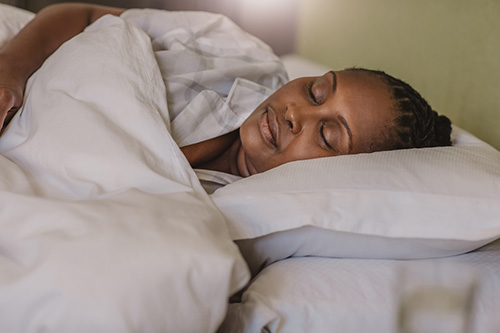While most of us have headaches every now and then, many women feel plagued by them. Headaches can disrupt all aspects of your life — sleep, work, and your personal time with friends and family. Having headaches can certainly keep you from doing the things you love in life, but it can also serve as a clear indication that something is out of balance in your body.

Because there are many possible root causes for headaches, finding the definitive source of your headaches can be difficult, but we do know that they can often arise during periods of shifting hormones, including the days leading up to your menstrual period, or the time leading up to menopause.
Generally speaking, hormonal headaches occur due to imbalanced levels between estrogen and progesterone. This is why many women notice headaches right before their periods when progesterone naturally dips. Progesterone can also drop during perimenopause (the period leading up to menopause) sometimes causing headaches as well. Taking steps to balance your hormones makes all the difference when it comes to avoiding hormonal headaches.
“The more severe headaches were located behind my eyes. They lasted 48 hours with little relief. I had to try something! My headaches dissipated almost immediately one week after starting this approach. I am feeling better, and sleeping better too.”
Corinne, customer
As women try to track down just what’s triggering their headaches, some may find that chronic stress or thyroid imbalance may potentially be involved. Chronic stress can lead to an imbalance in your adrenal glands and cause fatigue-related headaches, while a thyroid headache may occur with other symptoms like fluid retention, constipation, or cold intolerance.
Rest assured, you can take natural steps to alleviate the headache burden on your body. This can help you feel significantly better — often so much better that you can continue your normal activities without missing a beat.
Which profile best describes your experience with headaches?
- Headaches and hormonal imbalance. Women who have never had headaches in their lives may begin to see them as they enter perimenopause. Hormonal fluctuation can cause headaches to happen cyclically, corresponding to the natural ebb and flow of progesterone and estrogen. Hormonal headaches and menstrual migraines may also occur at ovulation, when estrogen and other hormones spike or when estrogen and progesterone bottom out during menstruation.
- Headaches and adrenal imbalance. If you think you might have adrenal imbalance, your headaches might arise with the onset of stress. They may also arise after the “low” that often follows a caffeine or sugar “high.” It’s extremely common for women with adrenal imbalance to get in the habit of using sugar and caffeine to spark the energy they need to get through the day. This vicious circle can leave the body depleted and cause headaches. Adrenal headaches may also come with other symptoms like light-headedness upon standing, fatigue, or salt cravings.
- Headaches and thyroid imbalance. If you’ve recently noticed that you have chronic headaches or migraines, they could be related to a thyroid imbalance. Daily persistent headaches related to thyroid tend to bother both sides of the head and have a pressing or tightening quality. They generally aren’t made worse by physical activity, but can be aggravated by intense light or sound. You may find that your thyroid-related headaches occur in conjunction with cold intolerance, skin issues, loss of energy, constipation, and/or fluid retention. Many women — and even their doctors — don’t make the connection between headaches and hypothyroidism or subclinical hypothyroidism, though balancing your thyroid can make a big difference in headaches.
What you can do today
To move towards a headache-free future, your best first step is to buy a notebook and begin tracking your headaches.
Why it works
When you keep track of the details surrounding the onset of your headaches — time of day, foods you ate prior, stress level, and other lifestyle factors that might contribute, it can help narrow down the possible root cause of your headaches. That information will guide you to take proactive steps to relieve, and possibly prevent, headaches.
Natural headache prevention
We know that living life while you’re dealing with regular or persistent headaches can be an isolating and frustrating experience. But know that you are not powerless when it comes to headaches. With a little thought and attention, you’ll find a natural solution that will provide headache relief.
Instead of reaching for ibuprofen or Excedrin the next time your headaches occur, try an approach that will help you get to the root cause of your headaches so you can get rid of them for good.
Whether your symptoms are linked to your hormones, adrenal glands, or thyroid, we can help you break free of your headaches and get back to your life. Keep in mind, however, that if you develop a serious and sudden headache that feels unbearable, you should check with your doctor right away, as this can be a sign of a serious health issue.
Headache relief — our Hormonal Health Protocol
Over the years, we’ve found that many headaches are connected to natural hormonal shifts that occur during our periods and around menopause. The Hormonal Health Protocol can help you restore hormonal balance — supporting you with high-quality nutritional formulations, herbal hormonal support, and an easy-to-follow natural eating plan that doesn’t leave you feeling hungry or deprived.
If you think your headaches may be connected to adrenal imbalance, find out how to naturally support your adrenal glands.
If you think your headaches may be connected to your thyroid health, see more our T-Balance Plus.
If you have questions about our Health Protocols, you can always call us toll free at 1-800-448-4919 and talk with real women here in Maine who have been in your shoes. We’re here to listen and help.










